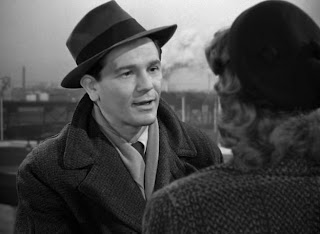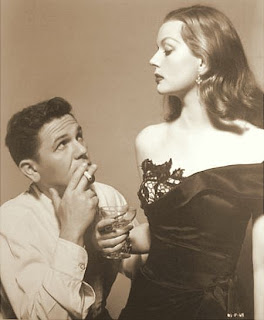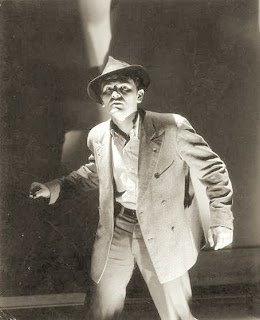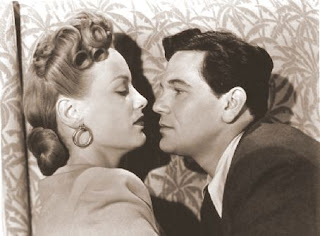 'A man alone ain't got no chance' -John Garfield as Harry Morgan in The Breaking Point (1950)
'A man alone ain't got no chance' -John Garfield as Harry Morgan in The Breaking Point (1950)Garfield reenacted Hemingway's hero in
The Breaking Point (played previously by Humphrey Bogart in
To Have and Have Not, 1944), affirming: "I think it's the best I've done since
Body & Soul. Better than that". His chemistry with Patricia Neal is immensurable, although before the shooting Garfield had offhandedly reminded her that she was going to play a whore in the picture.
Reading
He Ran All The Way: The Life of John Garfield (2004), a biography penned by Robert Nott with a special emphasis in Garfield's filmography and the 50's witchhunt that would seal his fate abruptly, we come to understand the normalcy and humanity behind a film icon when separated from his Hollywood proscenium.

Organized in 20 chapters: (
Birth of an Antihero, Robbe, An Actor's Life, The Group, Awake and Sing, Golden Boy, Hollywood, The Assembly Line, Heavenly Express, The War Years, Between Two Worlds, Breaking Out, Noir Land, Force of Evil, The Good Life, The Breaking Point, Red Scare on Sunset, Sucker for a Left Hook, Last Days, and
Nobody Lives Forever), Nott's book is a passionate journey through Golden Hollywood's sieves and simultaneously a caution tale.

John Garfield (1913–1952), son of Russian-Jewish immigrants, was born Jacob Julius Garfinkle on the Lower East Side of New York City. He started working for the left-wing Group Theater (where he'd establish a lasting friendship with playwright Clifford Odets) before gaining a contract with Warner Bros in 1938. "I came to Hollywood fully expecting to hate it and with myself all set for the kick in the pants that I felt sure I would get", Garfield said in 1939. He got kicked, first by Jack Warner, when he was sent to J.W.'s huge art deco office. With a Cuban cigar hanging out of his mouth, Warner did a silly soft shoe for Garfield before vigorously clasping his hand.

"I suppose it was a fifty-fifty chance then which I would achieve -Sing Sing or Hollywood", Garfield once boasted. "He wasn't that tough. He was a really nice kid. He was a sad kid. A loner", recalled classmate Michael J. Coppola. All of his close friends always called Garfield "Julie".
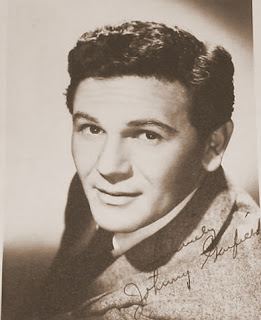
His subdued acting style and expressive eyes turned him into a noir icon who merged romantic gloom and sensuality in his doomed, ingenuous persona. Robert Sklar described Humphrey Bogart and John Garfield as the major “city boy” actors of the Golden era.

Garfield played falsely accused outsiders in
They Made Me a Criminal (1939) and
Dust Be My Destiny (1939), callous gangsters in
Castle on the Hudson (1940),
East of the River (1940), and
Out of the Fog (1941), and emotionally scarred veterans in
The Fallen Sparrow (1943) and
Nobody Lives Forever (1946).

His most celebrated role was Frank Chambers, the drifter in classic noir
The Postman Always Rings Twice (1946), who embodied the root-less hobo during the Depression, impulsed by his attraction to Cora (Lana Turner) into murdering her new-American husband. As Mark T. Conrad wrote of Tay Garnett's film adaptation of James M. Cain's novel: “It has the feeling of disorientation, pessimism, and the rejection of traditional ideas about morality”.

Other important films in which Garfield starred:
The Sea Wolf, Tortilla Flat, Destination Tokyo, Humoresque, Pride of the Marines, and
Gentleman's Agreement.

John Garfield was the first "rebel" actor in film history, opening the door for all the other cinematic anti-heroes: Montgomery Clift, Marlon Brando, James Dean, Steve McQueen, Paul Newman, Robert De Niro, etc. Garfield's more obscure name must be rescued for the next generation's cinephiles and screenagers.
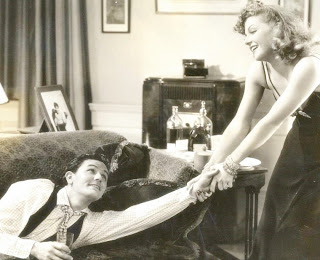
In
They Made Me a Criminal (1939) directed by Busby Berkeley, Garfield plays champion boxer Johnny Bradfield. His manager kills an inquiring reporter while Johnny is in a drunken stupor and frames Johnny for the murder, so the prizefighter has to take refuge on a farm. There he meets Peggy (played by Gloria Dickson, who allegedly had an affair with Garfield) and the Dead End Kids. Garfield would be linked romantically to a few more of his co-stars (Frances Farmer, Hedy Lamarr, Joan Crawford... although only Lana Turner's affair is expressly confirmed).
When his Warner Bros. contract expired in 1946, Garfield went independent founding Enterprise Productions, playing the lead in two films that supported his social views: Robert Rossen’s boxing noir
Body and Soul (1947) and Abraham Polonsky’s
Force of Evil (1948).

In
The Breaking Point (1950), he played a troubled boat captain forced into smuggling to provide for his family. His final film was
He Ran All the Way (1951), written by Guy Endore (Dalton Trumbo's alias) and Hugo Butler, directed by John Berry, all victims of blacklisting. Garfield plays the crazed thug Nick Robey, who, desperate for a home, romances Peg (Shelley Winters) undecisively.
The first decade of American film noir was largely the product of a socially committed faction in Hollywood, composed of “Browderite” communists (after Earl Browder) and “Wallace” Democrats (after Henry Wallace).

During the 1950's, the congressional hunts for communists in Hollywood created a kind of noir scenario for their victims.
Tacitly blacklisted for his left-wing sympathies, Garfield (who had relentlessly supported U.S. troops through the Hollywood Canteen) refused to name names in April 1951 and was found dead of a heart attack only a year later.
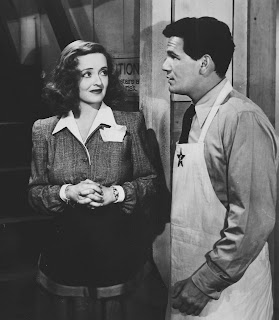
According to Jake Hinkson in an article for the
Noir City Sentinel (2009): "Garfield had never been a [communist] party member, and he had no desire to put the finger on any of his friends just to save his career".
One of the stories surrounding
Detour's transition to screen involved John Garfield, who had reportedly urged Warner Bros to acquire the novel rights (instead of Tom Neal, Garfield could have starred as Al Roberts, the N.Y. pianist who enroutes hitchhiking to California).
Detour was directed in 1945 by Edgar G. Ulmer, a member of the Frankfurt school (
Dialectic of Enlightenment), of Jewish ancestry and Marxist orientation, forced to flee Nazi Germany in the thirties. Ulmer’s margination in the industry would anticipate John Garfield's and Abraham Polonsky's.
Abraham Polonsky (admired by Steven Spielberg, Martin Scorsese, Sidney Lumet) was also a leftist who debuted with his masterpiece
Force of Evil (1948), based on Ira Wolfert’s novel
Tucker’s People, which presciently alerted against new capitalist temptations.

John Garfield plays the mob lawyer Joe Morse: “I wasn’t strong enough to resist corruption, but I was strong enough to fight for a piece of it.” Joe seduces Doris (Beatrice Pearson) promising her an imaginary jewel.
"Garfield, whose training, whose past were the environment of the romantic rebellion the depression gave birth to, became a public target for the great simplifiers", said Polonsky. These simplifiers were Parnell Thomas, McCarthy, Cohn, Edgar Hoover, and the rest of the HUAC scourges.

"
Force of Evil was pivotal", wrote Eddie Muller in
Dark City: The Lost World of Noir, and "invites present-day viewers to connect the dots between Ben Tucker [Morse's corrupt ally] and the corporate raiders and merger pirates of contemporary Wall Street. To Hollywood's racket bosses, [Garfield] was a brash upstart.

No artist exemplified the naturalist approach more than John Garfield. While directors and cinematographers are routinely lauded for developing the noir ethos, it was actually Garfield, more than anyone else, who gave early noir its defiant face and voice.
Body & Soul and
Force of Evil both chronicle a world in which it's far too late to isolate corruption and root it out. More than thirty years separated
Body & Soul and
Raging Bull, but the philosophical left hook remained the same: you can't control the way the world works, only how you choose to live within it. It may well be the noir credo".

"
Force of Evil never died", Polonsky said in the early 1990's.
-John Garfield as Joe Morse in
Force of Evil (1948): "You could inherit a fortune, you could work hard all your life for it, or you could steal it".
-Jeremy Irons as John Tuld in
Margin Call (2011): "There are three ways to make a living in this business: be first, be smarter, or cheat".

Time Out magazine reviewed Garfield's performance as a conflicted pugilist in
Body & Soul (directed by Robert Rossen, with James Wong Howe's brilliant cinematography and David Raksin's semi-jazz score) as "social criticism disguised as noir anxiety”. Polonsky called his script 'a fable from the Empire City'.
Julie Garfield noted similarities between her father in real life -he refused to betray his colleagues when he testified before HUAC two years after playing his role in
Body and Soul: “It's so strange that he made this film. He [too] didn’t sell out.”
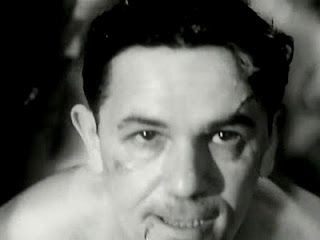
John Garfield's beginnings were as dramatic as his final days, he'd suffered a hard-up childhood, he'd contracted typhoid fever (which caused him irreparable heart damage), he'd lived a short period of vagrancy involving hitchhiking, freight hopping, picking fruit... (Preston Sturges conceived the film 'Sullivan's Travels' after Garfield's adventures). Garfield had made his Broadway debut in 1932, in a play called 'Lost Boy'.

His first film,
Four Daughters (1938) by Michael Curtiz, was a big hit and Garfield had received an Oscar nomination. He would receive a second nod for
Body & Soul (1947).
James Naremore recounts the leftist origins of film noir in
More than Night: Film Noir in Its Contexts: "most of the 1940's noir directors — Orson Welles, John Huston, Edward Dmytryk, Jules Dassin, Joseph Losey, Robert Rossen, Abraham Polonsky, Nicholas Ray— were members of Hollywood’s committed left-wing community. Dashiell Hammett, Graham Greene, and Eric Ambler were Marxists, and Raymond Chandler and James M. Cain were widely regarded as social realists". Let's remember that
The Postman Always Rings Twice novel (1934) had been banned in Boston because of its sexual and violent content.

Garfield stated, "The trouble is liberalism is unpopular today and anybody who is for the underdog gets labeled a red." John Berry tried to convince John Garfield to move to Europe. Garfield wouldn't do it. "He was a deep American guy", Berry said. "As John Garfield he was a big symbol of the American dream". Robert Whitehead (theatrical producer) agreed: "He was truthful, naïve and dead-on honest".
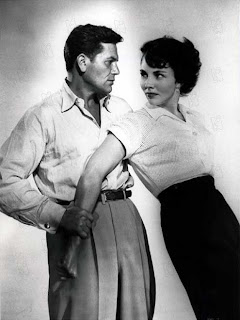
This political paranoia cut off John Garfield's career. "He never lived long enough to become an icon like Humphrey Bogart", said David Heeley, one of the producers of "The John Garfield Story" on TCM. Garfield "was being loyal to people, not to a place, a country, a Constitution", wrote Archer Winston.
Garfield confided to Robert Blake that not having been able to play Joe Bonaparte in
Golden Boy on film would be "one of the biggest heartbreaks of my career". "I'm not the kind of actor that becomes a star in Hollywood", Garfield confessed, "I would normally have been a character actor, but Mike Curtiz made me a star in Four Daughters". Strangely, Garfield had missed the possibility to play one mythical role, Stanley Kowalski, which skyrocketed Marlon Brando’s profile (Brando'd mutter: “They should have gotten John Garfield” during
A Streetcar Named Desire's rehearsals).

One of Robert Nott's most acute conclusions closing his riveting illustration of John Garfield's invaluable significance in film history: "He embodied a fatalistic sense of cool long before Mitchum, Dean or McQueen did. From always admiring Garfield as an actor, I came to admire him as a human being for his simplicity and honesty. He made the attempt. He both succeeded and failed. In the end, he probably felt like one of his screen characters, caught up in a noir scheme that he didn't understand and couldn't escape".
Maybe John Garfield couldn't escape, but he never hid from himself and he ran all the way looking for a dignified exit.

John Garfield as Charley Davis, the boxer who refuses to sell his fight bout in
Body & Soul (1947)
Article first published as
Book Review: He Ran All The Way: The Life of John Garfield
 "Love is a universal migraine, A bright stain on the vision, Blotting out reason” -poet Robert Graves
"Love is a universal migraine, A bright stain on the vision, Blotting out reason” -poet Robert Graves
 Kristen Stewart in a Press Conference for "Breaking Dawn" at the Four Seasons Hotel in Beverly Hills, on 6th November 2011
Kristen Stewart in a Press Conference for "Breaking Dawn" at the Four Seasons Hotel in Beverly Hills, on 6th November 2011 
 Robert Pattinson and Kristen Stewart at the Los Angeles premiere of "Breaking Dawn", on 14th November 2011
Robert Pattinson and Kristen Stewart at the Los Angeles premiere of "Breaking Dawn", on 14th November 2011
 Robert Pattinson and Kristen Stewart at the UK premiere of "Breaking Dawn" on 16th November 2011
Robert Pattinson and Kristen Stewart at the UK premiere of "Breaking Dawn" on 16th November 2011 While it wasn't quite able to reach the series high mark, The Twilight Saga: Breaking Dawn Part 1's outstanding estimated $139.5 million opening indicated that the sexy teen vampires are as popular as ever. Breaking Dawn's $139.5 million opening is second-best among Twilight movies behind 2009's New Moon ($142.7 million).
While it wasn't quite able to reach the series high mark, The Twilight Saga: Breaking Dawn Part 1's outstanding estimated $139.5 million opening indicated that the sexy teen vampires are as popular as ever. Breaking Dawn's $139.5 million opening is second-best among Twilight movies behind 2009's New Moon ($142.7 million). That's a small gap, though, and Breaking Dawn still managed to claim fifth place on the all-time opening weekend chart behind Harry Potter and the Deathly Hallows Part 2, The Dark Knight, Spider-Man 3 and New Moon.
That's a small gap, though, and Breaking Dawn still managed to claim fifth place on the all-time opening weekend chart behind Harry Potter and the Deathly Hallows Part 2, The Dark Knight, Spider-Man 3 and New Moon.


 Robert Pattinson, Kristen Stewart and Taylor Lautner in Entertainment Weekly photoshoot
Robert Pattinson, Kristen Stewart and Taylor Lautner in Entertainment Weekly photoshoot She was relieved to see the gorgeous, but still mysterious, dress Carolina Herrera designed just for Bella Swan. As for saying farewell to Bella, Kristen feels like she already has, but she will always have the memories.
She was relieved to see the gorgeous, but still mysterious, dress Carolina Herrera designed just for Bella Swan. As for saying farewell to Bella, Kristen feels like she already has, but she will always have the memories.